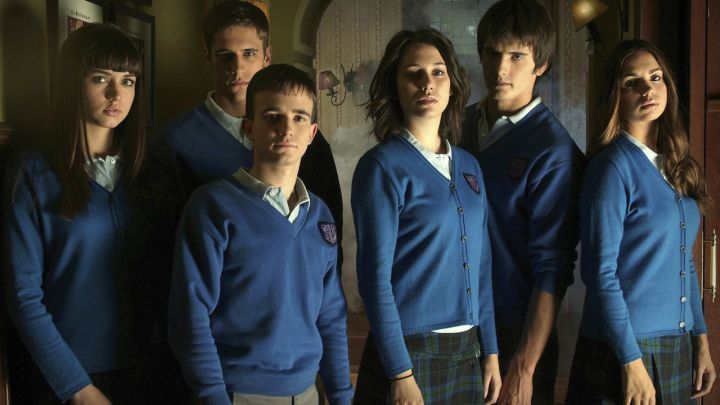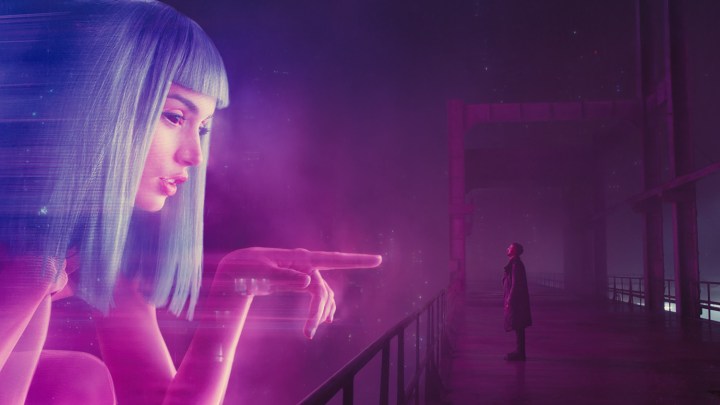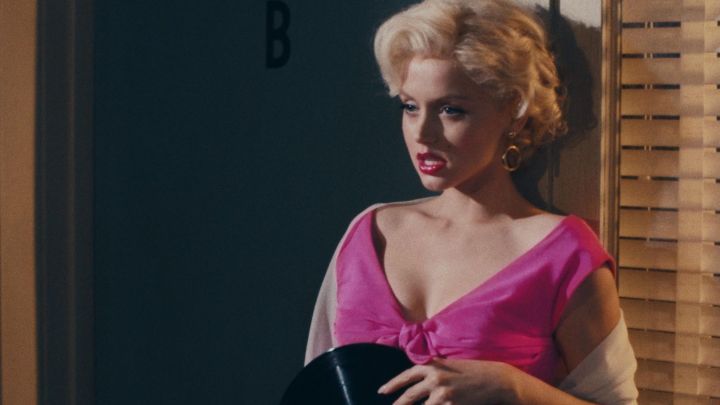
Ana de Armas: from Bond girl to Blonde’s Marilyn Monroe
Ana de Armas is Hollywood’s “It Girl.” Three years after her breakthrough, Golden Globe-nominated performance in Rian Johnson’s whodunit Knives Out, de Armas is back with a vengeance. She’s the star of Andrew Dominik’s psychological drama Blonde, a highly fictionalized take on Marilyn Monroe’s life. De Armas bravely steps into the shoes of one of cinema’s greatest icons, the embodiment of glamour and, as it turns out, Hollywood’s ultimate tragic figure.
Multiple actresses have played Marilyn, from Mira Sorvino to Michelle Williams, in projects that ranged from serviceable to insightful to outright exploitative; Blonde exists somewhere in between. Flawed and brutal, Blonde is as interested in dissecting the myth of Marylin as it is in utilizing it to its benefit. Dominik’s unforgiving, in-your-face approach results in an uneasy viewing experience that many simply won’t be able to sit through. And yet, if there’s one reason to see Blonde, it’s Ana de Armas.
Even the film’s harshest critics admit the film is worth seeing for de Armas’s outstanding performance. Like so many of her previous films, Blonde lives and dies with her; she is the reason to come and stay. If anything, Blonde should confirm what de Armas loyalists have known for over a decade: behind her delicate façade lies a fierce talent, and it’s time to let it shine.
Boarding school beginnings
 Image used with permission by copyright holder
Image used with permission by copyright holder
De Armas was born and raised in Cuba. Her first major starring role — a romantic drama called Una Rosa de Francia — led to her casting in the popular Spanish teen drama El Internado. Blending elements of mystery with trashy drama, El Internado became a sensation when it premiered in the spring of 2007. Mix Riverdale with Élite, and you’ll get El Internado.
El Internado began as a good, old-fashioned mystery starring unbearably beautiful quasi-teenagers before degenerating into something else. By season six, it included everything from ghosts and Nazis to deadly viruses and even a teenage girl who spent years in stasis before returning to cause mayhem. Throughout the show’s first six seasons, de Armas played Carolina, the show’s de-facto female lead.
Re-watching El Internado is a bizarre experience. If one manages to get over the cringe and sometimes stupid dialog and the rather poor production values, there’s a genuinely compelling ensemble of actors trying their best to keep the boat afloat; once again, think of the Riverdale cast fighting not to throw up at every line of dialog they utter.
De Armas was one of El Internado‘s greatest weapons. She made Carolina inspiring and feisty while keeping her relatable; de Armas commanded the room, often making up for any lack of energy her co-stars might bring into the scene. Carolina was a natural leader, rallying her friends to search for answers, and de Armas embodied her energy and spirit flawlessly, creating a modern spitfire that many actresses her age would struggle to bring to life.
El Internado opened many doors for de Armas, allowing her to star in the successful 2009 comedy Mentiras y Gordas. Still, the teenage soap soon proved too small for de Armas’ appetite, and the actress left in 2010, with the show killing her character off. Struggling to find roles for a woman her age and fighting against typecasting, she starred in some films but found her career declining because of a lack of opportunities. Encouraged by her agent, de Armas ventured where many others tread before her: the City of Angels.
On the cusp of stardom
 Image used with permission by copyright holder
Image used with permission by copyright holder
Per her own words, de Armas spoke very little English when she arrived in Los Angeles. Enrolling in intensive classes to master the language, de Armas found it difficult but worked hard to overcome Hollywood’s many biases against Latino talent. Still, her efforts landed her a role opposite Mr. Nice himself, Keanu Reeves, in Eli Roth’s Knock Knock. In an interview with The Hollywood Reporter, de Armas confessed she learned her lines phonetically and talked about the meetings she had with her team at CAA, with whom she couldn’t communicate because of the language barrier.
Knock Knock is a tough cookie to crack. Uneven and campy, the film failed to make a lasting impression on critics or audiences. She later re-teamed with Reeves for what was supposed to be a jarring, surreal drama about heavy topics like domestic violence and child sexual abuse. The end product, Exposed, was a Frankenstein of a movie that reduced her role in favor of retooling the story as a Reeves action vehicle.
Knock Knock (1/10) Movie CLIP – Lost Girls (2015) HD
Exposed received scathing reviews, but de Armas quickly bounced back with the drama Hands of Stone — her first major role in Hollywood, shot in 2014 but released in 2016 — and the satirical comedy War Dogs. Despite playing small supporting roles, de Armas impressed critics, who noted her ability to elevate what would otherwise be thankless and borderline meaningless characters.
Then came Blade Runner 2049. 2017 was a milestone year for sci-fi cinema, with modern classics like Logan, War for the Planet of the Apes, and The Last Jedi premiering to critical and commercial success. Also included among this embarrassment of riches was Dennis Villeneuve’s cerebral neo-noir Blade Runner 2049, a sequel to the 1982 Ridley Scott classic. Starring Ryan Gosling and Harrison Ford, 2049 saw de Armas play Joi, the holographic A.I. love interest to Gosling’s K.
Villeneuve, a gifted storyteller, used Joi to bring some much-needed warmth to the cold and clinical 2049, turning her into the film’s heart. Despite having a small role in a nearly three-hour space epic, de Armas was one of the most memorable parts of the film. Enhanced by Villeneuve’s striking visuals, de Armas was a seemingly inexhaustible source of charm and charisma, a vibrant splash of color among the film’s murky and subdued color palette. Critics thought so, too, and de Armas received the best reviews of her career up to that point.
Blade Runner 2049 wasn’t commercially successful, and de Armas spent most of 2018 away from the spotlight, living in Cuba and facing the doubt and uncertainty that plagues many actors’ lives. Still, her breakthrough was around the corner, thanks to Rian Johnson’s 2019 whodunit Knives Out. Starring opposite A-listers like Daniel Craig and Chris Evans, de Armas held her own in a role that few other actresses could’ve portrayed. Marta is almost too perfect, and nuance was needed to prevent her from becoming implausible or, perish the thought, boring. Virtue is among the hardest thing to convey, and de Armas aced it, not by playing but by embodying it.
Knives Out (2019) – Lying Makes Me Puke Scene (1/10) | Movieclips
Defying the limitation of what could easily be a stereotypical wholesome Latina caretaker, de Armas flips the script and delivers a commanding and unforgettable performance. As Marta Cabrera, de Armas is a walking, beating, bleeding heart. She breathes life and intent into the story, playing the straight woman to the wild antics of the all-star cast surrounding her and still managing to steal the film from underneath them.
De Armas received critical acclaim for her performance, with many critics commending her for deftly handling a tricky role. Knives Out catapulted her to the A-list, earning her a Golden Globe nomination and turning her into Hollywood’s most promising It Girl.
Gentlemen (and everyone else) prefer Ana
 Image used with permission by copyright holder
Image used with permission by copyright holder
The COVID-19 pandemic put an abrupt and unceremonious stop to de Armas’ stratospheric rise to stardom. 2020 would’ve been a landmark year for her, starting with the April release of No Time to Die, the 25th film in the Bond franchise. However, the virus forced studios to delay their precious blockbusters for over a year, meaning No Time to Die premiered more than a year later, in September 2021. It’s hard to say if the last Craig film was worth the wait, but one thing is for sure: Ana de Armas runs away with the movie.
As Paloma, de Armas is enchanting even when she’s violently taking down bad guys. Bubbly and spontaneous but as capable and kickass as Bond himself, Paloma is a Bond girl for the ages. Despite having only one extended sequence during the film’s first half, de Armas steals the audience’s heart and never gives it back. No Time to Die could’ve used more of her charm, but perhaps it’s best she walked away while on top.
De Armas followed No Time to Die with Adrian Lyne’s Deep Water, an erotic thriller that’s neither erotic nor thrilling enough. A far cry from Lyne’s sexual masterpieces of the ’80 and ’90s, Deep Water‘s off-screen shenanigans — including the real-life romance between de Armas and the internet’s punching bag, Ben Affleck — were more interesting than the film itself. She also reunited with Gosling and Evans for the Russo Brothers’ The Gray Man, a by-the-numbers and instantly forgettable action romp.
The Last Supper | Deep Water | Hulu
This week, de Armas faces the biggest challenge of her career. Blonde premieres on Netflix and the discourse it’ll generate is already giving me a migraine. Seemingly designed to divide and provoke at any cost, Blonde exists to stir the pot and encourage a conversation; what said conversation entails is unclear, but no one seems too excited to engage in it. However, de Armas’ performance will not be ignored; she might not sound or look much like Marilyn but she evokes her to perfection. De Armas thus follows a string of performances that forsake imitation in favor of a more naturalistic and evocative take — think of Kristen Stewart in Spencer, Taron Egerton in Rocketman, and Austin Butler in this year’s Elvis.
If not for the film’s deliberately confrontational nature, de Armas might even be a shoo-in for a Best Actress nomination. However, Blonde is a film about exploitation that, ironically, exploits and, in many people’s opinions, desecrates the memory of one of Hollywood’s most misunderstood and abused women. Blonde arrives at a time when audiences are less fascinated by Marilyn’s pain and more willing to call out the injustices committed for the sake of “art.” For what is Blonde if not an insult to the memory and legacy of Marilyn Monroe? It’s not a film that cares about its subject as a person but rather as an icon, lifeless and unreachable, meant to be admired and adored, but not necessarily loved or appreciated.
BLONDE | Official Trailer | Netflix
So where does this leave de Armas? She’s giving the performance of her career, that much is true, and Blonde will surely open new and more interesting doors for her. Even if she doesn’t make it to the Best Actress race this year — and chances are, she won’t — she’ll still come out of this film with a new reputation as a performer. Who can say when her Oscar-worthy role will come, but I’m hopeful it will. In the meantime, de Armas will reunite with Chris Evans for an Apple TV+ rom-com titled Ghosted and lead the John Wick spin-off, Ballerina. It took years for de Armas to reach her Hollywood potential, but she finally did it, and luckily for us, she’s not going anywhere.


